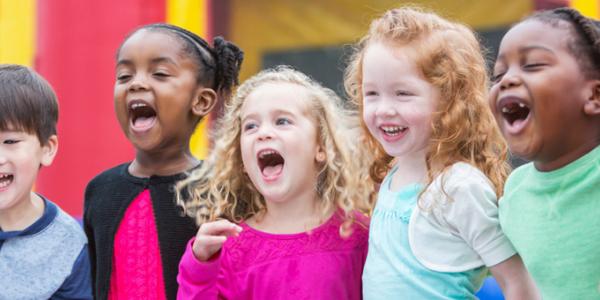What Does a High-Quality Preschool Program Look Like?

You are here
Teachers focus on these areas to help children learn best.
Creating a Caring Community of Learners
In a high-quality preschool, children develop positive relationships with each other and their teachers. Teachers
- Are warm and caring, and they get to know each child and family well
- Help children learn how to play, work together, and make friends
- Plan activities so that all children can join in
- Include every child's family, language, and culture in the program
Teaching to Support Children's Development and Learning
Teachers set up the classroom, choose materials, and plan activities that support children's learning. They also
- Provide materials and activities that interest children and challenge them
- Encourage children's efforts by making specific comments
- Set clear limits for children's behavior and explain the reasons
Planning and Adapting Curriculum
A preschool curriculum is based on what most preschoolers should know and be able to do. Teachers plan and adapt curriculum to help children learn and grow by
- Setting learning goals for children that are challenging but achievable with help
- Balancing group activities and instruction guided by the teacher with activities children choose themselves
- Providing enough time for children to get deeply involved in activities and learning
- Paying attention to and supporting children's interests, skills, and knowledge
Assessing Children's Development and Learning
Through regular assessment, teachers understand what each child knows and can do. This helps them decide which materials, activities, and experiences to add to help children continue learning. Teachers assess children's learning and development by
- Regularly taking notes on what children do and say
- Collecting samples of children's drawings and writings
- Taking photos of the things children make
- Using screening tests to identify when children need more learning support
- Asking you what activities your child does at home and what interests he has
Developing Relationships With Families
Teachers want to build trusting relationships with families. They know that you are the most important people in your child's life. Teachers partner with families by
- Listening to families' goals and concerns for their children
- Encouraging families to participate in the program in different ways
- Showing respect for each family and its language and culture
- Trying to find ways to communicate in a family's home language
Warning Signs
There are many wonderful preschool programs. But you might see some things that don't help children learn and develop. A few examples are listed here. If you're concerned about something you see, talk to the teacher or program supervisor.
- The space is not organized. Children wander around and aren't really involved in activities. Or, teachers control all activities so children aren't ever free to explore materials or play.
- Children are given worksheets, flashcards, or toys that can be used just one way. Other materials don't let children make choices and solve problems.
- Teachers don't participate in children's activities. They don't ask questions or make suggestions that help children learn deeply. Or, they tell children what to do and how to do it.
- Teachers don't set clear limits for children's behavior. Or, they respond to misbehavior by punishing children instead of helping them learn what they could do next time.
- Teachers rarely share information about children's progress with families. They mainly talk to families when there is a problem and don't ask about a family's wishes and concerns. Programs don't try to communicate with families in ways they can understand.
The first few years of your child's life are such important learning years. Connecting with warm, caring adults early on helps your preschooler form strong relationships throughout his life. Together, you and your child's teachers can make good choices that'll give your child a great start!